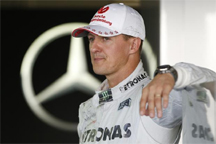SUZUKA, Japan, (Reuters) – Michael Schumacher achieved more than any other driver in Formula One but the winner of a record seven world championships and 91 grands prix could not beat time however hard he raced.
Announcing his second, and seemingly final, retirement at the Japanese Grand Prix yesterday, the German acknowledged that it was time to go at the end of the season in November.
The Schumacher Mark II, now 43 years old and driving a suitably silver Mercedes, has become a scuffed shadow of the shiny Mark I model who dominated racetracks around the world in the colours of Benetton and Ferrari.

“I have decided to retire by the end of the year,” he told reporters.
His truly remarkable career will stand as a drama in two parts, with a three-year intermission, that some will see as an entirely fitting outcome for a driver who also divided the sport like few others.
Back in 2006, when Schumacher informed the world that he would be retiring as a Ferrari driver at a Monza news conference after the Italian Grand Prix, it seemed like the end of an era.
He had a string of records to his name, including finishing every race on the podium in 2002 and winning the title with six races to spare. In 2004, he chalked up a record 13 wins with seven of them in a row.
Yesterday’s announcement did not seem as momentous after three disappointing comeback years with Mercedes in which he has so far produced just one podium finish – and that a third place this year.
YOUNGER TALENTS
The Formula One world has moved on and younger talents, such as Red Bull’s double world champion Sebastian Vettel and Schumacher’s replacement Lewis Hamilton, now command the attention.
Schumacher still holds many of the records but Vettel is now the youngest ever double champion, after winning his first at the age of 23. Last year the young German also chalked up a record 15 poles.
The man who was supposed to lead the ‘Silver Arrows’ works Mercedes back to the top of the podium was a mere spectator when team mate Nico Rosberg – 26 at the time – secured the long-desired win in China this year.
There has been a question mark over Schumacher’s future all season and he said yesterday, after replacing it with a full stop, that he felt released from his own doubts.
“I have had my doubts for quite a while, whether I personally have the energy and motivation to do so (carry on). I have achieved so much,” he said.
“I told you in 2006 that my battery was empty. And I am on the red zone with my batteries,” he continued. “I wasn’t sure whether you could recharge them with the time that you have available and I felt that it’s time for freedom again.”
Self-doubt was never a big part of the old Michael Schumacher’s make-up. The freedom he enjoyed then was of the town of Maranello as Ferrari’s undisputed number one.
Ayrton Senna was loved, despite the Brazilian’s sometimes questionable tactics on the track, and mourned after his death in 1994. Argentine Juan Manuel Fangio was admired, Briton Jim Clark revered.
Schumacher may be the greatest, although the number who would dispute that has grown after three unimpressive years, but he will never rank as the most popular.
“I think he is the greatest racing driver of this century,” said Mercedes team principal Ross Brawn, an accolade that also neatly sidestepped the sport’s first 50 years and comparisons with the greats of yesteryear.
LESSONS LEARNED
Schumacher has softened, prepared to admit mistakes. He has, he freely recognised, learned lessons and become more approachable.
Yesterday, he even practised his Italian – something he rarely managed even in his glory years when Ferrari fans worshipped his success but often wished he would be a little less German.
“In my first career, as I entered into Formula One (with Jordan in 1991), immediately I had a lot of focus on me. So there was a constant demand and pressure on me that was difficult to cope with over the years,” he said.
“In that absence (from 2007 to 2010), I was more free and recharged myself…when I was back I noticed it is possible to be open, to enjoy, but not lose the focus. And that is something I was not doing in the first part.
“(In the second part) I had a bigger picture, I had more experience, it was much more easy to handle things.”
Yet the controversies of the past still hang over his reputation like the mists that shroud his favourite Spa circuit in the Belgian forests.
There was the collision with Damon Hill in the 1994 title decider, the notorious attempt in 1997 to run Jacques Villeneuve off the road and the global scorn and outrage that followed Austria 2002 when Ferrari ordered Brazilian Rubens Barrichello to gift him an undeserved win.









